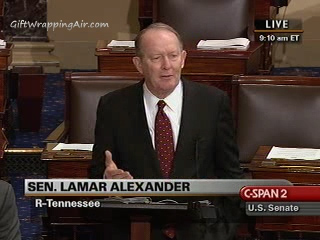Senate Continues Reconciliation Debate... The Alexander Amendment to Reduce the Cost of Student Loans
Published March 24, 2010, 8:43 am, CST
Updates: video
by Diane W. Collins
dcollins@marketingweb.com

|
Sen. Lamar Alexander offers amendment that would reduce the cost of student loans |
The Senate continues to reveal the effects of the Health Care Reform legislation through debate on the floor. Sen. Lamar Alexander (R-TN) who has served as the United States Secretary of Education as well as the President of the University of Tennessee had some exceptional points as he offered an amendment to The Reconciliation Act of 2010.
Sen. Alexander explained that included in the Reconciliation Act is another program through which the Federal government takes over student loans. The expressed interest of the Federal government is to make student loans "cheaper and more convenient." Yet, Sen. Alexander suggests this is not true. To substantiate the claim Sen. Alexander states the Federal government borrows money more cheaply than the private sector at 2.8% yet it intends to charge students 6.8%. In addition, the money according to Sen. Alexander will not go back to the students or be used to help improve education but instead will be used to help pay for the health care program .
Another consequence of the Reconciliation Act Sen. Alexander points out is the increase in tuition students will inevitably see. The reason? States will experience a large increase in Medicare / Medicaid enrollees because of the Health Care Reform bill. Budgets strained, the states will look for cuts. California, the precursor of liberal program results has already seen this as students protested a 34% increase in their state tuition witnessed this past week on national television.
As Sen. Alexander points out, 19 million student loans will be affected by the Reconciliation Act beginning July 1st. He asks us to think of the "working" students going to community college to try to improve their lives. They, like all students will be forced to borrow from the Federal government where according to Sen. Lamar they will be "overcharged" and as a direct result of this bill will see an increase in their tuition. According to the Congressional Budget Office (CBO) the overcharge to students will be $8.7B which will be used to pay for the health care bill. Then, of course, there is the loss of approximate 31,000 jobs of those involved in the institutions marketing private/federally backed student loans... like community banks.
The Alexander Amendment currently in debate would require the Federal government to reduce the 6.8% scheduled for student loans to 5.3% arguing the Federal government has the ability to borrow at a lower rate than private lenders; and that all monies collected should be used for the benefit of higher education... not health care reform. President Obama is proving once again, he is a fair weather friend. As long as he needs you, he makes promises using philosophical rhetoric that appeals to the idealistic. Ironically, he's punishing the base that helped elect him... he's going to give our students their first taste of the real world. (In an unrelated aside, we're still wondering when Obama will sign the Executive Order he promised to Rep. Bart Stupak... the one eliminating the use of Federal funds for abortion.) Sen. Judd Gregg (R-NH) made an interesting observation near the end of Sen. Alexander's remarks. Had the Reconciliation Act not included the Student Loan take-over provision... it wouldn't have qualified as a reconciliation bill.
Again, the Republicans are trying to add amendments to The Reconciliation Act of 2010. Should an amendment succeed the Reconciliation Act of 2010 would be sent back to the House. This does not reverse the Senate Health Care Reform Bill (Christmas Eve Bill) the President signed into law on Tuesday, March 23rd. That bill is law. Republicans cannot at this point reverse health care reform by stopping or postponing The Reconciliation Act of 2010, but they can mitigate its effect while displaying the true consequences for our citizens and our economy.
FIND / CONTACT YOUR REPRESENTATIVE
Further reading: